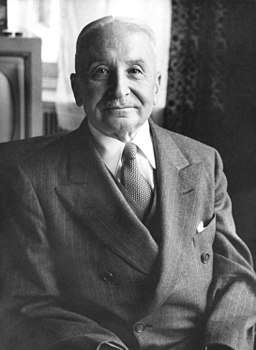December 25th is certainly a time for celebration among those of us observing Christmas, but today also marks a day for all of humanity to rejoice and celebrate, regardless of creed, for today marks the 30th anniversary of when the Soviet sickle and hammer last flew over the Kremlin, marking the dissolution of the Soviet Union.
The inhumanity and deprivation of that tyrannical regime remains terrible to contemplate. According to political scientist R.J. Rummel (1994), conservative estimates of the deaths deliberately caused by Soviet government policy, or “democide” as he refers to it, between the years 1917 and 1987 amount to almost 62 million people. Let that figure sink in, particularly because these figures do not include combat deaths on the Eastern Front during World War II (which would further increase the figure by millions), but deaths caused by state-sanctioned famine, imprisonment, and outright murder.
What’s tragic about such figures is that the objectives of socialism were diametrically the opposite- namely, to bring forth a more economically prosperous world without class struggle. As Karl Marx and Friedrich Engels state in The Communist Manifesto (1848 [1998], p. 75), the “proletariat will use its political supremacy to wrest, by degrees, all capital from the bourgeoisie, to centralise all instruments of production in the hands of the state, i.e., of the proletariat organised as the ruling class; and to increase the total of productive forces as rapidly as possible.”
Despite the abject failure of socialism to achieve its stated and well-intended ends, and the appalling figures outlined above, renewed sympathies for central planning are not absent. For example, according to a poll conducted by the Levada Center (2021), a Russian non-governmental research organization, as much as 60 percent of Russians are supportive of central planning as an appropriate means for allocating resources, with a corresponding decline in acceptance of a market economy[3]. Perhaps this figure speaks more to the way in which “privatization” at the hand of Russian “oligarchs” was implemented during the post-Soviet transition period, and that Russians have come to associate a market economy with cronyism.

Written in the memory of my late father-in-law, Spiridon Albu, who persevered the tyranny and deprivation of socialism in Romania and was a never-ending support of my pursuit to articulate the case for a free society.
My point here is not to use this poll to infer such a conclusion, but to appeal to a whole generation of individuals who are alive today, and who might still appeal to socialism as the means for organizing an economic system, but have no living memory of life in the Soviet Union, nor of the tyranny and deprivation it imposed behind the Iron Curtain (as has been recounted to me by my loved ones who, fortunately, survived that tyranny to celebrate Christmas with me). Did socialism fail in the Soviet Union because the “wrong people” were in charge, or did socialism fail because it generated the very conditions for the wrong people to become in charge? The answer to this question, I argue, turns on the continued relevance and understanding of an argument first put forth by the great Austrian economist, Ludwig von Mises.

In the context of Soviet experiment with socialism, Mises wrote his classic article “Economic Calculation in the Socialist Commonwealth” ([1920] 1975), in which he argued that abolishing private property in the means of production would eliminate the possibility of central planners to allocate scarce resources according to their competing consumer uses, resulting in economic waste. This is because only within a context of private property are individuals able to exchange resources, the act of which generates exchange ratios denominated in money, also known as market prices, which are necessary to calculate the opportunity costs of using resources in the production of one consumer good, as opposed to another. Therefore, the impossibility of economic calculation under socialism is based not on any lack of motivation among central planners to allocate resources according to its most valued consumer uses, but because, without private ownership of those resources, the context-specific knowledge that is necessary – communicated through market prices in the form of profit and loss signals – simply does not exist for the central planner (see Boettke 1998, p. 149). The failure to understand the logic of Mises’s argument by economists outside the Soviet Union only reinforced the myth, through Soviet propaganda and fictitious statistics, that the Soviet GDP would eventually surpass that of the United States (Levy and Peart 2011; see also Ebeling 2020).
Mises’s critique was the first salvo in what became known as the Socialist Calculation Debate, in which proponents and opponents of Mises attempted to defend or counter his claim, respectively. For my purposes here, I will not directly address the arguments made during that debate, the definitive account of which was written by Don Lavoie (1985a).[4] Rather, the main point I wish to argue here is that the “knowledge problem” (Hayek 1945) that is inherent to the problem of economic calculation extends not only to the comprehensive planning of an entire economy, but also applies to any form of non-comprehensive planning in which an individual is not assigned residual claimancy for their decision-making.
To illustrate this point, let’s take a very simple and mundane example of economic calculation that I’ve used elsewhere (both here at EconLog and in a working paper co-authored with Peter Boettke and Peter Jacobsen), one in which scarce resources must be sorted to consumers according to their willingness to pay: the allocation of overbooked passenger seats on an airline. When passenger seats are overbooked, from an economic perspective, there is a conflict between consumers because of an imperfect assignment of property rights by the airline. This raises a question: what method of (re)allocation can be utilized to resolve such a conflict? An involuntary method of reallocating seats can be used, known as “bumping,” the consequence of which could be the violent removal of an individual from their seat, as exemplified by the United Airlines 3411 incident in 2017. Otherwise, a voluntary method can be used, utilizing market pricing to calculate the scarcity of airline seats, as was first devised by Julian Simon (1968) in the form of a reverse auction. According to this latter method, passengers are assigned the ability to exchange claim to their seats, in effect creating the conditions for economic calculation. This exchange process generates knowledge that is discovered only through the reverse auction, namely the discovery of who is the person with the lowest reservation price. Given that airlines in this case are private, for-profit firms, one could not claim that its owners are neither more nor less motivated before or after the implementation of the airline overbooking auction system. Therefore, a lack of motivation cannot explain why an airline had been unable to allocate airline seats to consumers who value them the most. Rather, without the knowledge generated through the reverse auction, it would be simply impossible for the airline to discover which individual would have the lowest reservation price.
To be fair, one could object and argue that Mises’s critique (and my example above) are not applicable here. Given that Mises raised his critique in the context applied of economy-wide central planning, it may be the case that I am attacking a strawman, which is not applicable to today’s context, especially if the word “socialism” is being conflated today with “a larger welfare state,” “income redistribution,” or some other loose terminology that does not fit the classic definition of socialism (i.e. abolition of private property in the means of production). Moreover, one might also object that socialism as practiced in the Soviet Union, as well as Eastern and Central Europe in the past, or Cuba, North Korea, and Venezuela in the present, are not exemplary of “real-world socialism,” because their failures were caused by the “wrong” person being in charge, someone who was not well-motivated to allocate scarce resources in a peaceful, productive and responsible way. However, “[w]hether applied to comprehensive or noncomprehensive planning,” Lavoie (1985b, p. 57) argues, “the knowledge problem argument crucially depends on the view that knowledge is not the same as data, that is, given pieces of explicit information” that be gathered through search. Rather, “economic rivalry among competitors in the market,” as in the case of an auction, “generates knowledge that no rival on his own could have possessed in the absence of that rivalry” (1985, p. 26), particularly the price that an airline must pay to the individual giving up his or her seat as compensation for the error of overbooking. The point here is that even if we assigned Mother Teresa as a central planner, however well-intended or well-motivated she may be, she would still be precluded from the knowledge necessary for economic calculation, because such knowledge, embodied in market pricing, does not exist outside the context of exchangeable private property.
How is all of this relevant to the example of the auction solution to airline overbooking? Nothing about the failure of an airline to assign airline seats according to consumer valuations can be attributed to the lack of motivation on the part of the airline, since it is a private firm striving to earn the highest profits possible. Such airlines were just as motivated to maximize profit before the existence of the overbooking auction as they were after its implementation. And yet, without economic calculation established through a reverse action, airlines are unable to address the misallocation of overbooked airline seats, despite being well motivated to do so. Again, my example may seem, at best, irrelevant, or at worst, just the silly cleverness of an economist with an ideological ax to grind.
My point, however, is not a trivial one, but one with deadly serious implications. That is, if there are renewed calls for socialism, then how can we even begin to even reconsider its implementation on a grand scale if it is impossible to rationally calculate the price of overbooked airline seats outside the context of an auction, even under the best-case scenario of a well-motivated, profit-maximizing firm? The point of my illustration has not been meant to be an exercise of cleverness, but an exercise of warning. When so many innocent individuals have paid for the ideal of socialism with their own blood, as illustrated by the figures above, it is high time to remember that the nature of this problem, even under conditions as small-scale as an airplane, is not one of a lack of motivation, but of a lack of contextual knowledge that only emerges in the context of exchangeable private property rights. Moreover, if voluntary exchange and market pricing is not utilized as a means of competition for scarce resources, then individuals will learn involuntary methods of resource allocation, which is “why the worst get on top” under socialism, as F.A. Hayek (1944) argued. Overbooking on an airline without auction pricing as a solution can get an individual “bumped” from an airline against their will, but failure to comply with the central plan of socialist regime can get millions of individuals executed. Thus, socialism failed in the Soviet Union, not because the wrong people were in charge, but because the socialist economic system generated the very conditions for the wrong people to rise to the top and become in charge (see Boettke 1995).
This continued relevance of Mises’s original contribution to the socialist calculation debate must be constantly reiterated, one that applies to planning and coordination not only across markets, but within any economic organization, both profit and non-profit. Without it, civilization and continued human progress hangs in the balance.
Rosolino Candela is a Senior Fellow in the F.A. Hayek Program for Advanced Study in Philosophy, Politics, and Economics, and a Program Director of Academic and Student Programs at the Mercatus Center at George Mason University.
References
Boettke, Peter J. (1995). “Hayek’s The Road to Serfdom Revisited: Government Failure in the Argument Against Socialism.” Eastern Economic Journal 21(1): 7–26.
Boettke, Peter J. (1998). “Economic Calculation: The Austrian Contribution to Political Economy.” Advances in Austrian Economics 5: 131–158.
Boettke, Peter J., (Ed.). (2000). Socialism and the Market: The Socialist Calculation Debate Revisited (9 Volumes). New York: Routledge.
Ebeling, Richard M. (2021). “Socialism-in-practice was a Nightmare, not Utopia: Ludwig von Mises’s Critique of Central Planning and the Fall of the Soviet Union.” The Review of Austrian Economics 34(4): 431–448.
Hayek, F. A. (1944). The Road to Serfdom. Chicago: University of Chicago Press.
Hayek, F.A. (1945). “The Use of Knowledge in Society.” The American Economic Review 35(4): 519–530.
Lavoie, Don. (1985a). Rivalry and Central planning: The Socialist Calculation Debate Reconsidered. New York: Cambridge University Press.
Lavoie, Don. (1985b). National Economic Planning: What is Left? Cambridge: Ballinger Publishing.
Levy, David M., and Sandra J. Peart. (2011). “Soviet Growth and American Textbooks: An Endogenous Past.” Journal of Economic Behavior and Organization 78(1-2): 110–125.
Mises, Ludwig von. ([1920] 1975). “Economic Calculation in the Socialist Commonwealth.” In F.A. Hayek (Ed.), Collectivist Economic Planning (pp. 87–130). Clifton: August M. Kelley.
Rummel, R. J. (1994). Death by Government. New Brunswick: Transaction Publishers.
Simon, Julian L. (1968). “An Almost Practical Solution to Airline Overbooking.” Journal of Transport Economics and Policy 2(2): 201–202.
[1] Written in the memory of my late father-in-law, Spiridon Albu, who persevered the tyranny and deprivation of socialism in Romania and was a never-ending support of my pursuit to articulate the case for a free society.
[2] I thank Peter Boettke, Christopher Coyne, and Andreea Candela for their very helpful comments and suggestions.
[3] I am very grateful to Konstantin Zhukov for his research assistance in pointing me to this reference.
[4] For a selected collection of literature revisiting the socialist calculation debate, see also Boettke (2000).


READER COMMENTS
Christina Gina
Dec 25 2021 at 12:17pm
And what do you tell people who still believe in communism.
Mark Brady
Dec 25 2021 at 6:33pm
You illustrate Ludwig Mises’s insight with reference to the production of consumer goods, yet for Mises the two necessary conditions that must hold before monetary calculation can be employed in directing production are a market in higher-order goods and a universally employed medium of exchange.
I cannot recommend too highly David Ramsay Steele’s From Marx to Mises (1992). Steele had essentially completed his manuscript more than a decade before, and he had influenced Don Lavoie some years before Lavoie’s own book was published in 1985. I encourage you to check out the detailed contents and preface here: https://www.amazon.com/Marx-Mises-Capitalist-Challenge-Calculation/dp/0875484492
Comments are closed.